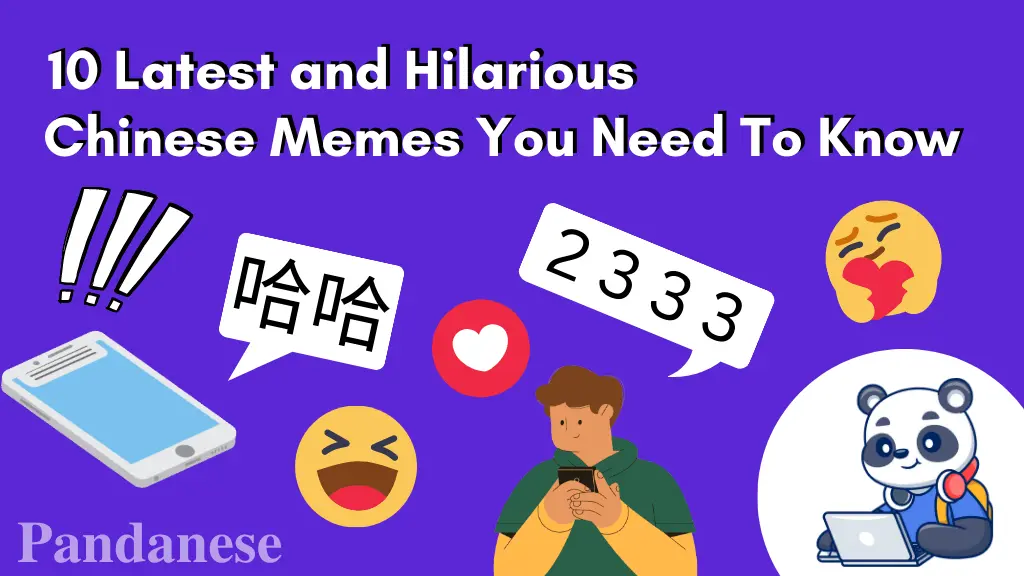
10 Latest and Hilarious Chinese Memes You Need To Know
Chinese memes are taking China by storm and making us all laugh.
They are an integral part of internet culture in China, providing a window into the country's unique sense of humor. To learn Chinese and to be more integrated with its culture, you should learn about the most commonly used memes and Chinese internet slang.
We will look at some of the latest Chinese memes, where they originated from, and what makes them so hilarious. We'll also explore the forms and origins of this ultimate collection of Chinese memes.
Origins of Chinese memes: Using Chinese characters and Chinese tones
One notable feature of Chinese memes is the use of Chinese characters. It brings multiple interpretations depending on context. Addiontlally, using different Chinese tones also gives the words and phrases different interpretations and adds depth to the memes.
Using memes for humorous or exaggerated statements has become a staple in Chinese humor. They can range from silly to insightful, and they serve as a way for Chinese netizens to connect and express themselves. Creating Chinese memes nowadays is easy because of the availability of online meme makers. Chinese memes provide a unique and entertaining form of online communication by using Chinese characters, tones, and meme expressions.
Presentation of Chinese memes: Using 表情包s (biǎo qíng bāo) or 梗s (gěng)
Chinese internet users are passionate adopters of "emoticon packs," or 表情包, and "meme material," or 梗. 表情包 are colorful, expressive images that often feature cartoon characters and serve to convey a wide range of emotions online.
On the other hand, 梗 refers to a specific type of meme that revolves around a joke, punchline, or cultural reference.

Both 表情包 and 梗 is used with this image of a duck, DailyView
Both 表情包 and 梗 are frequently used in online conversations and social media posts providing a fun and entertaining way for Chinese internet users to express themselves and connect.
These popular expressions of internet culture have become an indispensable part of daily life for many in China and continue to grow and evolve as technology advances.
Top 7 Latest and Hilarious Chinese Memes You Need To Know
1. 四次元少女 (sì cì yuán shǎo nǚ)—4D girl
四次元少女, or "Four-Dimensional Girl," is a popular Chinese meme featuring a picture of a girl with a surprised or exaggerated expression, and it is often used to express disbelief or amazement.
The name "Four-Dimensional" refers to the idea that the girl can see and understand things beyond the typical three dimensions of our physical world.
That's not to say they have superpowers, but they're usually just extra quirky, which netizens find endearing. This meme has become a staple of Chinese internet culture and is widely used in online conversations and social media posts.

Kpop Group Blackpink's Jisoo has always been called the "4D girl" for her quirky acts, Korea Star Daily
2. 感情伤害 (gǎn qíng shāng hài)—emotional damage

The emotional damage from being 1-inch away from 6 feet, Clinic Med
Emotional damage is a common theme in Chinese memes and is used playfully and humorously.
The idea is that the person has experienced some emotional trauma, often depicted as a physical injury. This concept is used to inject lighthearted humor into everyday situations, making even the most mundane things seem funnier.
For example, a meme might show a person who is "emotionally damaged" after being rejected by a crush but can still laugh at the situation.
These types of memes resonate with Chinese netizens as they offer a lighthearted way to approach sensitive or difficult topics.
3. 芭比Q了 (bā bǐ Q le)—barbie Q

芭比Q了 meme with a blurry Kumamon in the background, Girl Style
The original meaning of "Barbie Q" is BBQ, an abbreviation of “Barbecue.”
BBQ is a fun way of cooking and grilling. Usually, food on skewers is placed on the charcoal grill until they are fully cooked. After that, sauces are smeared on top for flavoring.
In a Chinese meme context, “barbecue” means “to be mentally and physically drained.” When someone says "Barbie Q," they say they are mentally and physically exhausted. It can also mean that something was screwed up by accident.
This famous meme represents the despair, and panic one feels once one realizes how the situation has worsened.
4. 葛优躺 (gé yōu tǎng)—Ge you slouch

Original scene of Ge You "Just let me rot away like this" in I Love My Home, new.qq
“Ge You Slouch” (葛优躺) Géyōu tǎng refers to the actor Ge You's posture sitting on a sofa in the 1993 sitcom "I Love My Home (我爱我家)."
In one of the episodes, Ji Chunsheng (played by Ge You) was brought to another character's home, where he ate, drank, and slept for days. This meme is also commonly thought to have inspired "lay flat culture."
His crude and unrefined posture has gained popularity, with many youngsters relating to this slouching posture.
Through his indulgence and unorthodox actions, they relieve pressure and his emotions during a time when life is becoming more stressful, work is becoming more demanding, and it's becoming harder to earn a living.
5. 退!退!退!(tuì ! tuì ! tuì!)—Retreat! Retreat! Retreat!

退!退!退!meme, Clinic Med
This meme is about the mannerisms of a local auntie during a quarrel, stamping their feet while making fencing moves with her hands and shouting, "Retreat! Retreat! Retreat"! The action is similar to expelling evil spirits.
退!退!退! originated from a viral video showing an auntie running an illegal food stall. When confronted by the parking space owner, she responded by stamping her feet and displaying a shoving action.
This hilarious scene, captured by a Chinese netizen, encapsulated the essence of a typical rural aunt's argument and became a widely loved meme.
6. 真香 (zhēn xiāng)—true fragrance

真香 meme, originating from this scene in "X-change," xinhuanet
Wang Jingze burst into fame from his participation in the reality show “X-change.” Wang Jingze was born into a wealthy family, and at the beginning of the show, it is clear that Wang Jingze is an arrogant, rebellious, and spoiled boy.
Wang Jingze's initial behavior is the setup for the show's next act, where his parents send him to live with a poorer rural family to teach him humility and appreciation.
At first, he wouldn't eat a bite of rice from his exchange family in Yunnan, but in the end, he changed his mind and took a bite of the food and said, “真香 .”
This act was endearing and heartwarming to the audience since he finally changed for the better.
7. 德安杰洛 德内罗表情 (dé ān jié luò dé nèi luó biǎo qíng)—D’Angelo Dinero smirk

D'Angelo Dinero's smirk after a win, tenor
D'Angelo Dinero, aka "The Pope," is a WWE wrestler who has left a lasting impact on Chinese meme culture through his iconic grin.
His facial expression, made after defeating a rival, has been immortalized in countless pictures and meme GIFs widely used in online communication.
Only the most knowledgeable Chinese meme experts would truly understand the magnitude of Dinero's popularity.
This grin has become a symbol of confidence, often paired with drawings, cartoons, or statements to express boldness and pride.
Whether he's breathing heavily and looking serious or breaking out into a proud grin, Dinero's expression has captured the hearts of Chinese social media users and has become a widely used meme.

Cartoon meme imitating D'Angelo Dinero's expression, sohu
8. Let's eat Chicken feet!

Turkey? Nah. Chicken feet? Yes!, TutorABCChinese
Commonly known as chicken feet in the West, this dish's Chinese name 鳳爪, fèngzhuǎ. While scary-looking at first, this is truly a feast for the senses and a delicacy worth exploring.
Chicken feet originates in China around the Zhou Dynasty. Cooking and eating chicken feet not only uses every part of an animal but also contains nutrients such as collagen, protein, calcium, and phosphorus.
Don't judge a book by its cover; don't knock it till you try it. Truly something to try when you see this dish.
9. Hot water meme 多喝热水

Hot water will cure anything, Pinterest
If you've done a homestay in China or lived in China for long enough, then you know about this strange habit.
This meme claims drinking hot water can cure almost any ailment or health issue. Headache? Drink hot water. Stomach ache? Drink hot water.
Definitely a favourite ones of ours.
10. Adding Er, Er, Er—儿儿儿 to every word

Beijing dialect meme, Reddit
To anyone who's been to Beijing or the North-Eastern part of China, then you know they know.
This accent adds the 儿 or the "er" sound to words. For example:
To work: 上班 (shàng bān) becomes 上班儿 (shàngbān er)
Girl: 女孩 (nǚ hái) becomes 女孩儿 (nǚ hái ér)
A little: 一点 (yīdiǎn) becomes 一点儿 (yīdiǎn er)
An easy language habit to pick up on.
Frequently asked questions
What are memes called in Chinese?
There are many translations of memes in Chinese. There's "表情包" (biǎo qíng bāo) which can be translated as an emoji package. There's also "迷因" (mi yin) or "模因" (mo yin).
What is that chinese meme face?

Chinese meme faces, Know your memes
They are similar to Western rage comic memes, such as the troll face or the forever alone guy. These Chinese meme faces hold a special place in Chinese online communities.
What is the Chinese panda meme called?

The making of the Chinese panda meme, Know your memes
The Chinese panda meme is part of 表情 (biao qing), which can be translated as facial expressions. The base panda, also called Biaoqing Panda or 熊猫人表情包.
Iconic facial expressions such as Choi Sung-kook's face from the film Three Kims or Elijah Samuel Burke's smirk are used on top of the panda.
In closing
When you learn Chinese, you should also learn about the country and culture. Chinese memes are a great way for you to learn Chinese naturally.
Chinese memes are a funny, intriguing, and amusing aspect of Chinese culture that showcases their wit and humor. From witty wordplay to comical screenshots from the most popular TV show or memes that are just plain weird but funny, Chinese memes demonstrate the boundless imagination and creativity of the Chinese people.
So, if you're seeking a lighthearted look into Chinese culture or want a good laugh, don't hesitate to explore the world of Chinese memes—it's guaranteed to bring a smile to your face!
Jing You is a Chinese native who grew up in the Fujian province and soaked in the Chinese culture while living with her grandparents. She later moved to Singapore to pursue further education. However, she has always been passionate about the Mandarin language despite being in an environment that speaks English predominantly. She was involved in multiple Mandarin and Chinese culture programmes in schools, and brought this passion forward by tutoring elementary school students Mandarin in her adulthood.
The easiest way to learn Chinese & build vocabulary

